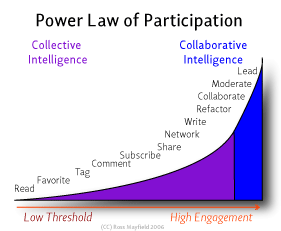
I was recently asked about how one could calculate the return on investment (aka
ROI) for innovation creation.
To clarify, the person was asking if there were information to show what the return on investment had been for companies that did and did not take on innovation actions.
My initial response was to talk about the cost of not innovating. Ruth Ann Hattori, from ThinkSmart, created a great
essay on this very topic. The question "What happens when you don't innovate but your competition does?" sums up the essence of the essay. Think Sony missing the iPod phenomenon or GM missing the boat on creating what Toyota did with the Prius.
Since the term Return on Investment is used in all sorts of ways, it helps to explain its use in the context of innovation. ROI, in short, is a calculation that compares the value returned to the resources expended to accomplish a specific action. In the finance world value and resources are usually money; comparison of the money earned (or lost) on an investment to the amount of money invested. For innovation ROI, the desire is to compare the resources put into innovation (activities, processes, and action) and compare them to the value of the outcomes (new patents, new products, new services, profit on those new products/services, etc.).
Ruth Ann's key point in her essay was to highlight the need to also consider the cost of
not innovating. While the dollars spent on innovation activities and the value returned can be compared, serious efforts need to be taken to consider the costs of not doing the innovation actions. She also hinted at the possibility of over analyzing out of existence any innovation actions before they even start.
In the book
Innovator's Solution, Clay Christensen and Michael Raynor talk about over analysis, not on ROI specifically, but on ideas created. They said that organizations strip the "potential from new ideas before they ever see the light of day". Trying to calculate ROI for early innovation efforts may wipe away the idea of doing innovation practices because the "lucrative hurdle" is not crossed.
However, there is still a desire for some sort of quantitative information on innovation actions. After all, people in business are always trying to reduce their risks, and launching a set of innovation actions can be risky, especially if innovation principles are not well understood. Are there examples of companies that implemented innovation activities and the outcomes from those activities? And, are there examples of companies that did not implement innovation activities and the outcomes from not doing those activities?
The answer is yes to the first one. Business Week regularly highlights many examples of companies that are labeled "innovative" because of their innovation actions. The article "
Masters of Innovation" highlights 25 people and their efforts to create an innovation culture. By extension, each of these people's companies are thought to be very innovative, using some form of the definition of innovative. Target in marketing innovation competing against the likes of Wal Mart, K-Mart, and Sears; Apple in product design (iPods, iMacs, etc) competing against Dell and IBM (computers), and Sony (mp3 players); and Proctor & Gamble in harvesting ideas from outside company competing against Energizer (batteries), Clorox (household products), and SC Johnson (household products).
The hard one to answer is "are there examples of companies that did not implement innovation activities and the outcomes from not doing those activities?". The answer is certainly yes, but it is difficult to identify them if those companies' innovation efforts were not publicly available. There are a few: Apple Computer had very mundane products between 1993 to 1997 and was rumored to be on the block to be bought up by everyone from AT&T to IBM. Apple came back to life when Steve Jobs returned in 1997, returning the innovation spirit and practice to the company.
IBM throughout its life has had great innovation processes and products and then some years of mundane products. Each return to greatness was preceded by a new leader that instilled a new sense of mission and gave employees a sense of responsibility with creative and innovation authority.
I believe that innovation actions are important to implement. Are these innovation actions quantifiable in an ROI calculation? I think only partially. There is enough evidence in the press to show that innovation actions can help but are not the only thing required to become an innovative company. There are also enough stories where certain innovation actions are stopped and the companies suffer.
One of the assumptions about doing an ROI calculation on innovation actions is that the innovation actions and processes are well understood and known so as to "predict" the outcome. The
Innovator's Solution book best addresses this topic in chapter one under "Is Innovation a Black Box?". Christensen and Raynor provide a great dissection of the belief's that innovation is a function of people talent, risk aversion, and a playing of the odds.



 And there was humor on wikis presented in Jimmy Wales' opening talk: Stephen Colbert Analyzes Wikipedia and gives us a new word Wikiality, YouTube video link and just audio, the first 2 minutes.
And there was humor on wikis presented in Jimmy Wales' opening talk: Stephen Colbert Analyzes Wikipedia and gives us a new word Wikiality, YouTube video link and just audio, the first 2 minutes.



